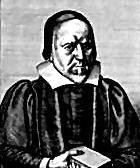How to give a true sense upon a place and to try the same so to be
Now to give this right exposition of the place; to judge of other men's interpretations, approving of the best, rejecting of the worst; to examine aright also variety of readings and translations; in what sense to take words of diverse meanings; to make supply of a grammatical ellipsis; yea and to reconcile rightly places which seem to disagree may be done by the means following.
By analogy of faith, the points of the Catechism
1. By the analogy of faith, for it must agree with the principles of religion, the points of catechism set down in the Creed, the Lord's Prayer, the Ten Commandments and the doctrine of the sacraments. Someone has said, with an obscure proposition first of all settle by a little disciplined and methodical recollection start from a principle in the same tradition and that shows the analogy.
This is what the Apostle meaneth and why he wills Timothy to keep the true pattern of wholesome words, the pattern hold thou of sound words, which one right well interpreteth thus, the right method in theological matters to which the interpretation of more obscure places may be brought, as regards 'settled and immovable interpretations (hermeneutics)', as the same author calls it, which if men would use, there should never be such monstrous opinions broached, nor so dangerous contentions raised in the church daily, as there hath been and now is. But everything would agree with faith and charity in which stands the form of wholesome words delivered by the apostles to which the four formerly mentioned may be fitly reduced. The Creed to Faith, as the sum thereof, and so the sacraments as seals confirming the same. To Love, the Commandments, which show us what to do to our neighbour; and the Lord's Prayer, teaching what to request of God for our neighbour.
By circumstances
2. By the circumstance of the place, what, who, to whom, by what, when, and how, observing carefully what goes before, what follows after. Of which things speaks St Augustine and St Jerome, on Amos 4 and Matthew 25 - by the preceding and succeeding being gathered comes the genuine sense of Scripture. (Augustine, Christian Doctrine, Book 2, Chap 31). We may not only look upon one word and sentence, and thereupon judge of all: the scope must withal be diligently attended unto, wherefore the words are spoken. As the order of the discourse is to be weighed for right interpretation, so the end is to be considered, to give a true sense; understanding comes when the cause being sought is ascertained. The saying of Hilary cited by Lyranus on Deut 28 whereunto agreeth that lawyers' rule, first and foremost is what the voice of reason dictates. On this see Augustine on Christian Doctrine Book 3, Chaps 5 and 10.
By comparing Scripture with itself
3. By comparing and comparing Scripture with Scripture, the place in hand with other places; the clearer expounding the more obscure; and the more places the fewer, as St Augustine saith. The Prophets must be compared with the Law, and the New Testament with the Old (Jn 5, Ac 17:11); for the Prophets expound Moses and the Apostles and Evangelists them both. This is the searching of the Scripture commanded by our Saviour and for which the Bereans are commended.
What Scriptures to be compared together with the same repeated
Now the Scriptures to be compared together are of three sorts.
1) With places, the selfsame in other places repeated, as that of God to Abraham, Gen 12:3 compared with 22:18, Acts 3:2, Gal 3:8 is the same repeated again, so Isaiah 29:13, again repeated Matt 15:8.
Yet here note, that these places are not so precisely repeated, but that sometimes there may be and is a little alteration and this is for five causes, which may be as helps to us in the interpretation of our text in hand.
Why the same places repeated sometimes have some alteration
1. For interpretation sake. Ps 78:2, Mt 13:38.
2. For to distinguish one thing from another as in Mic 5:1, Mt 2:6.
3. To make a restraint of somewhat more general to a more special as Dt 6:13, Mt 4:10 and Isa 29:13, Mt 15:8.
4. For application of the type to the truth and of a general to a special, as Jon 1:7, Mt 12:39, 40; Ps 69:25, Ac 1:20.
5. For brevity sake or that something fit not the matter in hand as Zc 9:9, Mt 21:5.
With places alike but not the same
2) Another kind is with places not the selfsame repeated, but others somewhat alike, and agree either in words, as Gen 28:12, Jn 1:55 and Gn 3:15, Rom 16:20 or in the meaning, being alike in substance of matter,as Mt 6:26, Gen 17:10, Solomon's precept in Proverbs 28:13 expressed by David Ps 32: 3-5. Here one place for illustration, is an example of the same kind, to a precept or exhortation: So likewise: 2 Sam 15:25, 26 a plain expressing of Peter's exhortation, 1 Pe 5:6.
With places unalike and differing or seeming contrary in appearance
3) The last kind is with place unalike, which show themselves seeming to disagree from the place in hand, when they be compared together and thus unlikeness is either in words or manner of speaking, as Ro 3:28, Lam 2:24, so 1 Kg 9:28, 2 Chr 8:18 and Zc 4;13, Mt 27:9 where the prophecy is ascribed to Jeremiah, or else disagree in the meaning, as Ac 7:16, Gn 48:22.
But here note that discord is not in Scripture, neither is one place contrary to another, albeit through our ignorance it seem so to us; but it is not so indeed. For in a contradiction, there must be two places having the same words in meaning, understood of one and the same thing or subject matter the same reason and end intended in one respect and manner of doing at the same time.


















